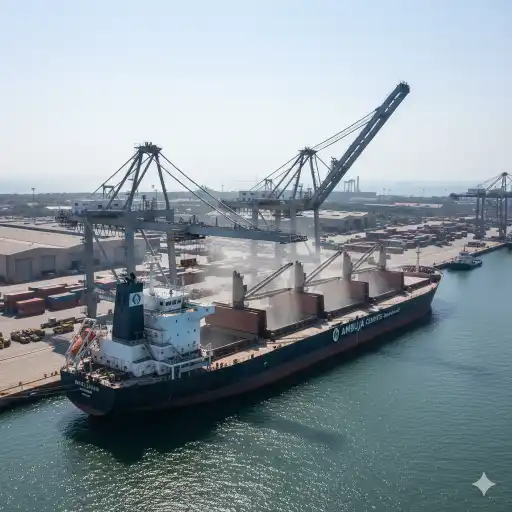Ambuja Cements, part of the Adani Group and India’s second-largest cement producer, has reportedly placed an order for seven conventional bulk carriers with China’s state-owned Nantong Xiangyu Shipbuilding & Offshore Engineering. The deal is valued at approximately $100 million, though Ambuja Cements has yet to make an official announcement.

Choice of Chinese Shipyard
Ambuja Cements considered Cochin Shipyard, Swan Defence and Heavy Industries, and yards in Indonesia, the Philippines, and Vietnam before selecting Nantong Xiangyu, citing competitive pricing and early delivery schedules. Nantong Xiangyu is part of Xiamen Xiangyu Group, a state-owned Chinese enterprise.
Purpose and Logistics Strategy
The 19,000-deadweight ton (dwt) bulk carriers will transport cement and clinker for Ambuja’s Sanghi Industries 6.1 million-ton capacity integrated plant in Kutch, Gujarat. The plant also produces 6.6 million tons of clinker.
Currently, Ambuja operates 11 dedicated cement carriers for transporting materials to consumption areas. Coastal shipping is considered more profitable than road or rail, and the combination of ships and trucks forms a key part of the Adani Group’s door-to-door logistics strategy, aiming to create a highly integrated and competitive business model.
Cement is also transported by trains in bagged form, requiring trucks for first and last mile delivery. Coastal shipping allows bulk movement, with cement bagged at destination ports for local dispatch. Industry sources note that this shift will transform Adani’s cement logistics.
Implications for Indian Shipyards
The decision to order from China represents a missed opportunity for Indian shipyards, which could have gained global recognition from such a major order. Sources say Indian yards face challenges in pricing and delivery timelines.
- Rear Admiral J S Mann noted that urgent delivery needs and pricing pressures likely drove Ambuja to China.
- Antony Prince, CEO at GTR Campbell Marine Consultants Ltd, highlighted that lack of slots and delivery certainty remain key issues for Indian shipyards.
- Bhupesh Tater, Director at Integri Marine and Offshore Services, emphasized that economics and cost inefficiencies dictate global competitiveness.
Another industry expert pointed out that Indian shipbuilding still lags in tooling, automation, and workforce skills, leading to longer build times, higher costs, and quality challenges. Improving these areas, rather than merely expanding order books, is critical for competing globally.
Looking Ahead
Experts agree that Indian shipyards need to address gaps in capacity, tooling, and efficiency to gain international trust. With new policies, visions, and implementation strategies, India could significantly close the gap in global shipbuilding competitiveness.
